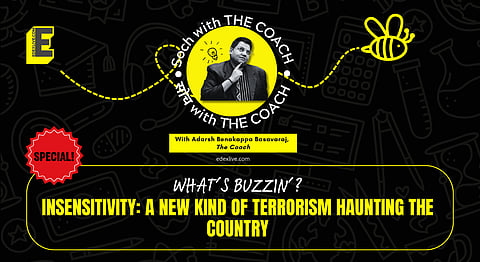
- News
- Campus
- Exam
- Podcast
- Web Stories
- Do You Know
- Path Finders - UG Programs
- Videos
- Élitscape

In the wake of the Pahalgam carnage of April 22, when assailants massacred 26 tourists in broad daylight, another kind of violence has taken shape because of this horrific act: the sense of indifference, suspicion, and outright hostility toward Kashmiri students across India.
Instead of mourning together, too many of us have weaponised grief into collective blame and misdirected anger, turning classrooms into zones of fear and homes into potential danger zones.
This insensitivity is a new form of terrorism — one that strikes at the heart of our shared humanity, and rather than "standing together" during times like these, it shall only make us "fall apart!"
Anger is a natural response to atrocity, I agree, but when it eclipses compassion, we tend to trade justice for revenge. Collective punishment is no justice at all; it’s just being "mob-like" action dressed up as righteous indignation.
Imagine being a student, miles from home, forced to choose between sitting for crucial exams, and fleeing to safety. That is the human cost of our unchecked fury.
Classmates glaring instead of a greeting, landlords evicting instead of protecting and empathising, and social media turning into a hunt for Kashmiri students to blame.
This insensitivity is terrorism of the heart: it fractures communities faster than any bullet.
My sincere appeal with folded hands: What we must learn — and act upon — now!
1. Individual accountability over collective punishment
Every act of terror is the responsibility of its perpetrator, not of an entire community. When mobs threaten Kashmiri students with eviction, assault, or worse, they betray the very principles of justice and the rule of law our nation stands by.
2. Empathy should be a daily practice, not a headline
Genuine solidarity demands more than a social media post. It means checking in on a classmate who’s too afraid to attend their lectures, inviting them for a cup of chai, or simply listening without judgment.
3. Education as the cure for prejudice
Ignorance breeds fear; fear becomes aggression. Use your platforms — college debates, mess hall conversations, family dinners — to share facts, dispel myths, and humanise faces behind headlines.
4. Courage to dissent against mob mentality
When you see someone hurling insults or sharing hate-filled messages, speak up. Solidarity is contagious — one voice of kindness can drown out a hundred yells of bigotry.
5. Resilience rooted in hope, not hate
To our Kashmiri peers: your dreams, ambitions, and kindness define you far more than the actions of a murderous few. Stand tall, and know that true strength comes from perseverance through adversity.
We cannot allow anger to eclipse compassion. History teaches us that when societies fracture along ethnic or religious lines, the wounds take generations to heal. It’s time we dismantle this new terrorism of indifference — one act of kindness at a time.
Because true strength isn’t measured by how fiercely we rage, but by how compassionately we heal.
With regards,
Adarsh Benakappa Basavaraj
Your Compassion Coach and Empathy Expert
